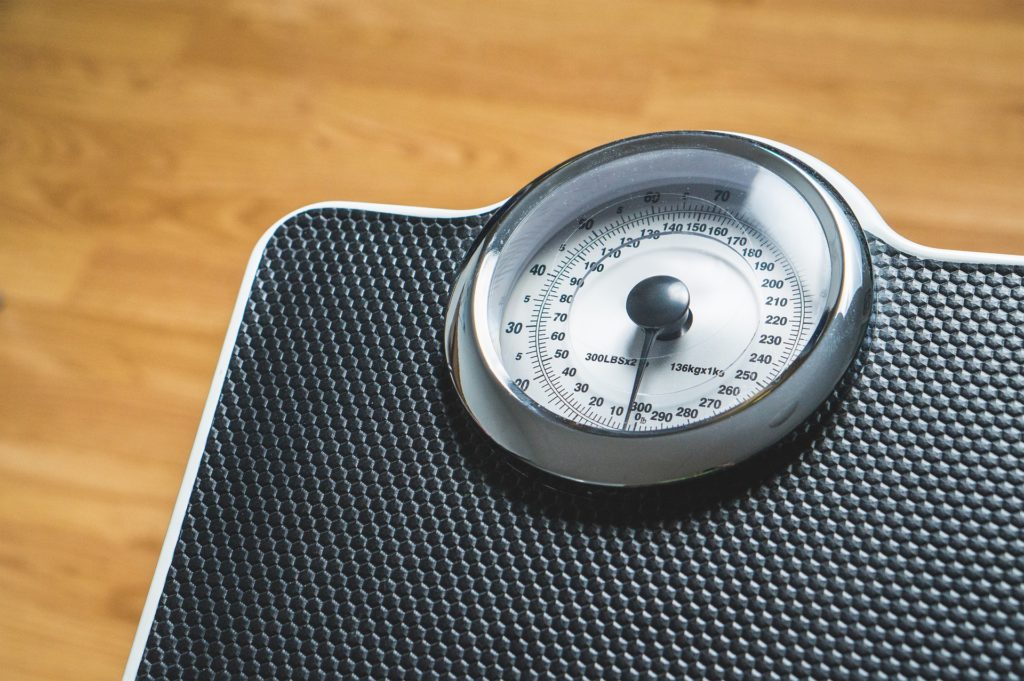It’s been said that you remember feelings more than words. How true. At about 36 weeks pregnant with my first daughter, I was at a routine midwife exam and made a joking yet serious comment to my midwife that I was “done gaining weight!” She breathed out a laugh and replied, “Sorry. This is when the baby does the most growing.” My heart sank.

Of course I wanted a healthy baby. And, of course, I wasn’t going to do anything to jeopardize the last few weeks of pregnancy. But, I remember that feeling oh so well.. that belief that I couldn’t possibly get any bigger. It felt like I was stuffed into my skin and simply couldn’t expand any further. Seriously? I was going to grow even more? I had gained weight gradually and was within the appropriate range, but could my body and mind accept anymore?
No longer did I feel ‘cute.’ I felt that the pregnancy glow that I had for months was fading.
From conversation with other moms, most everyone gets to ‘that place’- the one where they are just ready to deliver. The pure desire for their body to go into labor and be able to meet their little one for the first time is strong and powerful. But I have also heard moms talk about that last month feeling like a “whale,” an extremely tired one. The idea of more weight gain is quite unappealing.
I don’t have a history of an eating disorder or weight loss, but I definitely had some unkind body thoughts at the beginning and end of my pregnancy. Now pregnant with my second little girl and finishing the last few weeks of pregnancy, those thoughts have returned- not as strong, but definitely made an appearance. I don’t choose to meditate on them long but I sincerely understand the thoughts and feelings many women have about weight gain during pregnancy. For those who do have a history of losing a significant amount of weight or have dealt with an eating disorder in their past, I can only imagine how challenging it might be to gain a healthy amount of weight over the course of 9 months.
Curious about the prevalence of weight gain concerns among pregnant women, I consulted my current Nurse Practitioner/Midwife about this topic. She indicated that its quite common for females of all shapes, sizes, fitness levels and medical histories have significant concerns about weight gain.
While I think we all know that the old phrase “eating for 2” is false. So, how much do you really need to gain? More practically, how do you gain at a healthy rate? What are the ramifications of too little weight gain or too much?
Of course, weight is only 1 part of the challenge. It’s not just about the number on the scale, but the foods you are using to gain the weight. Nausea and sickness just adds another layer of complications.
As a Registered Dietitian Nutritionist, mommy and pregnant woman, I want to assure you that if you are feeling frustrated or insecure, I completely get it. Even if this topic is not coming up in the mommy groups, pregnant women are dealing with it. Today, I want to talk about the realities, recommendations and research regarding weight gain during pregnancy.
How Much Weight Should You Gain During Pregnancy?
Weight gain recommendations are created by the Institute of Medicine and based on your BMI (body mass index) before pregnancy:
| Body Mass Index (BMI) | Single Baby | Twins |
| <18.5 | 28-40 lbs | n/a |
| 18.5-24.9 | 25-35 lbs | 37-54 lbs |
| 25-29.9 | 15-25 lbs | 31-50 lbs |
| 30+ | 11-20 lbs | 25-42 lbs |
*Consult your physician for weight gain recommendations for triplets.
**Calculate your BMI
According to the CDC, only about ⅓ of pregnant women gain an appropriate amount of weight during pregnancy. Almost half (48%) gain too much and 21% gain too little.
What If You Don’t Gain Enough?
If the mother doesn’t gain an appropriate amount of weight, there is a risk of a low birth weight baby. This can contribute to:
- Compromised infant immune system or increased risk of illness
- Difficulty breastfeeding
- Developmental delays for baby
In addition, some research, like this study, shows that inadequate weight gain during pregnancy can contribute to infant mortality within the first year of life. While the cause is unknown and can only be speculated, it does reinforce the goal to gain an appropriate amount of weight as recommended by the IOM regardless of your starting, pre-pregnancy weight.
What are the risks of gaining too much weight?
Excess weight gain often contributes to a larger baby, which can make delivery more challenging and stressful for the mother and baby. There is a risk that the mother will have a difficult time delivering a large baby (baby could get stuck or struggle getting through the birth canal). There is also an increased risk of:
- postpartum weight retention for the mother
- childhood obesity for the baby
- cesarean delivery
- future maternal overweight/obesity

Is it just about calories and weight?
In order to gain about 1# per week, a mother would need to consume around 300-450 additional calories per day. Realize that a woman’s activity level significantly affects how many extra calories are needed. And, during pregnancy, it is likely that activity level reduces somewhat, due to fatigue, getting additional rest and intensity of exercise/exertion.
As a Registered Dietitian Nutritionist, I am not a big advocate of counting calories. Personally and professionally, I feel that individuals can get hung up on numbers and when the numbers don’t produce the results we expect, it can be frustrating or discouraging. YOUR body is amazing and can create life and nourish your baby for months! But, it is not a machine. It is complex.
In order to gain weight healthfully, think about how you can add nourishing foods into your current diet. This might mean adding 1 additional healthy snack or using healthy fats a bit more liberally. Most women will need to consume 5-6 mini meals per day in order to consume enough calories and nutrients. Do avoid making meals bigger. Large meals and high-fat meals (fried, heavy gravies, etc) can exacerbate reflux, which is common later in pregnancy.
Some nutrients highly important during pregnancy include iron, calcium, choline, DHA and folic acid. While nausea and food aversions can be common during pregnancy, it is important for the mother to do her best to consume as much variety as possible.
How can intuitive eating play a part in your eating plan?
Adding more calories and nutrients to your diet is not about “stuffing” yourself with more food. The reality is that pregnant women will find that they get hungrier during the day- because they are growing a baby!! It takes energy (ie. calories) and nutrients to do this. While there may not be an increase in hunger in the first trimester, most mothers will find it does increase later in pregnancy.
If you are have NOT noticed extra hunger, begin to pay more attention to your body signals during the day. Sometimes our body is sending us messages but we are too busy to notice.
Personally, intuitive eating is the method I use to gain weight during pregnancy. I do plan healthy meals and snacks for my day, and when my body says it is hungry, I nourish it. However, I have also noticed that my portions are a bit smaller- I get full a bit faster. Pregnancy has taken me to a new level of mindfulness, ensuring that I am eating as often as I need but not over-consuming when I do.
Does it matter how fast or slow you gain weight so long as you reach your target range?
It’s ideal to gain weight gradually, about 1# per week for most women during the 2nd and 3rd trimester. The baby grows at a gradual rate, placing more demands of the mother for nutrition and energy (calories).
Rapid weight gain during pregnancy, especially early on, can increase the risk of gestational diabetes mellitus. Essentially, this rapid weight gain may lead to early insulin resistance within the mother and therefore, make it much more difficult for the body to manage blood glucose.
Where does the weight gain go?
Many women may wonder why they need to gain so much weight if the average baby is only 7-8 pounds. Wouldn’t that be enough? Not exactly…
- Larger breasts: 1-3 lbs
- Larger uterus: 2 lbs
- Placenta: 1.5 lbs
- Amniotic fluid: 2 lbs
- Increased blood volume: 3-4 lbs
- Increased fluid volume: 2-3 lbs
- Fat stores: 6-8 lbs
- Baby: 7-8 lbs (average size)
1st trimester: 1-4 lb weight gain total (no additional calories necessary)
2nd/3rd trimesters: ½-1 lb per week, depending on your recommended weight gain per char

What are some healthy ways to add nutrients (and calories) to your typical eating plan?
Here are some ideas I have found healthy and appetizing:
- 6oz greek yogurt with 1 oz nuts
- 1sl whole grain/sprouted grain bread with 1 tablespoon nut butter
- 4 oz low fat cottage cheese with 1 cup fresh or frozen fruit
- Smoothie with 1 cup fruit, 4-8oz milk, 4 oz yogurt, 1/2 tablespoon chia or flax seed
- Cheese stick, 1 serving of whole grain crackers and a piece of fruit
- 1 serving of edamame beans
- 1-2 eggs with a piece of whole grain/sprouted grain toast*
*choose omega-3 eggs if you don’t eat 6 oz fatty fish at least 2x/week
A Registered Dietitian Nutritionist can help you devise a plan or additional easy meals that are nutrient dense and appeal to you. This will ensure that you aren’t lacking any specific nutrients, while also eating foods that are appetizing to you during pregnancy.
What if you are on track for too much weight gain? What should you do?
Don’t stress! It’s not worth it! The goal is a healthy baby and safe delivery. But, it is wise to consider why you might be gaining additional weight. Have a conversation with your healthcare provider and/or consider making an appointment with a Registered Dietitian Nutritionist to help you gain perspective and create a plan.
Here are a few questions to consider:
Am I drinking too many calories?
Am I eating at regular times during the day?
How often am I snacking or munching?
Are cravings contributing to excess calories?
Am I planning healthy meals for myself and my baby? (every time you eat, s/he eats too!)
Should you exercise to help manage your weight gain during pregnancy?
YES!!! The American College of Obstetricians and Gynecologists recommends that pregnant women get 30 minutes of moderate activity (like walking) 5-7 days per week, just like any other person. Pregnancy does not rule out exercise. In fact, research shows that exercise during pregnancy has significant benefits and minimal, if any, risks. While you might not be able to keep up the pace you could before pregnancy, continuing exercise patterns and working at the level your body can handle can actually help you:
- Manage weight during pregnancy
- Reduces risk of gestational diabetes
- Improve or maintain physical fitness during pregnancy
- Reduce postpartum recovery time
- Lowers chances of cesarean delivery
- May reduce issues with preeclampsia
There are many safe exercises during pregnancy including:
- Stationary cycling
- Low impact aerobics
- walking/jogging
- Modified yoga/pilates
- Strength training

If low back pain becomes an issue during pregnancy, water exercise has been shown to be a fantastic alternative. Definitely consult your physician or midwife about your exercise routine to ensure that if modifications are necessary, you are well-informed. There are a few exercises that are not recommended listed here.
Should you track your weight during pregnancy?
While it is ideal for women to gain the appropriate amount of weight during pregnancy, this is not an area to obsess about. In fact, as a Registered Dietitian Nutritionist, I would rather have mommy giving more attention to the types of foods she is eating and loading up her meals with as many nourishing foods as possible rather than have her focus on weight.
Your OB/GYN or Nurse Midwife measure weight and blood pressure during every routine checkup and that should be enough to monitor and see trends. If you have concerns about how fast you are gaining, lack of weight gain or simply feel anxiety about your weight gain, definitely initiate the conversation. This process of growing a baby takes more than 9 months! You deserve to feel confident, well-educated and secure throughout this process!
Concluding thoughts…
Weight gain might feel scary, or uncontrollable or it might just feel like a normal part of the pregnancy process. We all have personal thoughts, feelings, and histories that influence how we mentally and emotionally handle this 9+ month process of growing and nourishing a baby. If you are frustrated or feel nervous about weight gain, there are many women that identify and have similar concerns.
As a mommy, pregnant woman and Registered Dietitian Nutritionist, I believe there are some important steps to take to help you grow a healthy baby and gain an appropriate amount of weight:
TALK- Have an open and honest dialogue with your healthcare provider about how you feel about this topic.
EDUCATE YOURSELF- Become informed about the necessary reasons for weight gain.
REFRAME- It’s not about weight gain. It’s about growing and nourishing a healthy baby.
SEEK OUT COMMUNITY- Have healthy conversations with other mommies and pregnant women.
DRESS UP- Put on cute maternity clothes or makeup or an amazing pair of shoes… whatever makes you feel confident!
MEDITATE ON TRUTH- Find a scripture, verse, quote, or mantra to think on every time you find your thoughts lingering on the number on the scale or the size of your belly.
TRUTH: Her children arise and call her blessed; her husband also, and he praises her: “Many women do noble things, but you surpass them all.” –Proverbs 31:28-29 (NIV)
REFERENCES
Academy of Nutrition & Dietetics, Nutrition & Lifestyle for Healthy Pregnancy Outcomes
American Congress of Obstetricians & Gynecologists, Physical Activity & Exercise During the Pregnancy & Postpartum Period
Davis, R. R., Hofferth, S. L., & Shenassa, E. D. (2014). Gestational Weight Gain and Risk of Infant Death in the United States. American Journal of Public Health, 104(Suppl 1), S90–S95. http://doi.org/10.2105/AJPH.2013.301425
Hedderson, M. M., Gunderson, E. P., & Ferrara, A. (2010). Gestational Weight Gain and Risk of Gestational Diabetes Mellitus. Obstetrics and Gynecology, 115(3), 597–604. http://doi.org/10.1097/AOG.0b013e3181cfce4f
Mason, C., Foster-Schubert, K. E., Imayama, I., Kong, A., Xiao, L., Bain, C., … McTiernan, A. (2011). Dietary Weight-Loss and Exercise Effects on Insulin Resistance in Postmenopausal Women. American Journal of Preventive Medicine, 41(4), 366–375. http://doi.org/10.1016/j.amepre.2011.06.042
